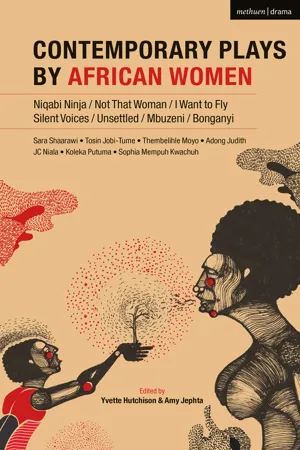
Contemporary Plays by African Women
Niqabi Ninja; Not That Woman; I Want to Fly; Silent Voices; Unsettled; Mbuzeni; Bonganyi
- 344 pages
- English
- ePUB (mobile friendly)
- Available on iOS & Android
Contemporary Plays by African Women
Niqabi Ninja; Not That Woman; I Want to Fly; Silent Voices; Unsettled; Mbuzeni; Bonganyi
About this book
This volume uniquely draws together seven contemporary plays by a selection of the finest African women writers and practitioners from across the continent, offering a rich and diverse portrait of identity, politics, culture, gender issues and society in contemporary Africa. Niqabi Ninja by Sara Shaarawi (Egypt) is set in Cairo during the chaotic time of the Egyptian uprising. Not That Woman by Tosin Jobi-Tume (Nigeria) addresses issues of violence against women in Nigeria and its attendant conspiracy of silence. The play advocates zero-tolerance for violence against women and urges women to bury shame and speak out rather than suffer in silence. I Want To Fly by Thembelihle Moyo (Zimbabwe) tells the story of an African girl who wants to be a pilot. It looks at how patriarchal society shapes the thinking of men regarding lobola (bride price), how women endure abusive men and the role society at large plays in these issues. Silent Voices by Adong Judith (Uganda) is a one-act play based on interviews with people involved in the LRA and the effects of the civil war in Uganda. It critiques this, and by implication, other truth commissions. Unsettled by JC Niala (Kenya) deals with gender violence, land issues and relations of both black and white Kenyans living in, and returning to, the country. Mbuzeni by Koleka Putuma (South Africa) is a story of four female orphans, aged eight to twelve, their sisterhood and their fixation with death and burials. It explores the unseen force that governs and dictates the laws that the villagers live by. Bonganyi by Sophia Kwachuh Mempuh (Cameroon) depicts the effects of colonialism as told through the story of a slave girl: a singer and dancer, who wants to win a competition to free her family. Each play also includes a biography of the playwright, the writer's own artistic statement, a production history of the play and a critical contextualisation of the theatrical landscape from which each woman is writing.
Frequently asked questions
- Essential is ideal for learners and professionals who enjoy exploring a wide range of subjects. Access the Essential Library with 800,000+ trusted titles and best-sellers across business, personal growth, and the humanities. Includes unlimited reading time and Standard Read Aloud voice.
- Complete: Perfect for advanced learners and researchers needing full, unrestricted access. Unlock 1.4M+ books across hundreds of subjects, including academic and specialized titles. The Complete Plan also includes advanced features like Premium Read Aloud and Research Assistant.
Please note we cannot support devices running on iOS 13 and Android 7 or earlier. Learn more about using the app.
Information
Silent Voices
Production history
Critical introduction
Table of contents
- Cover
- Half-Title Page
- Title Page
- Contents
- Introduction Yvette Hutchison and Amy Jephta
- Niqabi Ninja Sara Shaarawi
- Not That Woman ‘Tosin Jobi-Tume
- I Want to Fly Thembelihle Moyo
- Silent Voices Adong Judith
- Unsettled JC Niala
- Mbuzeni Koleka Putuma
- Bonganyi Sophia Mempuh Kwachuh
- Copyright